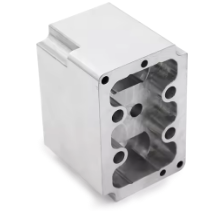Time to read: 6 min
Computer Numerical Control (CNC) machines are the backbone of modern manufacturing, offering precision and efficiency in producing a wide range of parts. To fully leverage the capabilities of a CNC machine, it's essential to understand its components. At Unofactory, we specialize in CNC machining and are here to guide you through the inner workings of these advanced machines.
What is a CNC Machine?
A CNC machine is a computer-controlled machine tool that uses a series of programmed instructions to perform complex machining operations with high precision. These machines are equipped with various components that work together to create precise parts from a variety of materials.
Key Components of a CNC Machine
Understanding the components of a CNC machine is crucial for operators, programmers, and engineers. Here are some of the key components:
Control Unit: The control unit is the brain of the CNC machine, interpreting the programmed instructions and controlling the machine's movements.
Drive System: The drive system converts the control unit's signals into motion, using stepper motors or servo motors to move the machine's axes.
Ball Screws: Ball screws are used in conjunction with the drive system to provide smooth and precise linear movement along the machine's axes.
Axes: CNC machines can have multiple axes (X, Y, Z, and more), allowing for complex movements and shapes.
Spindle: The spindle holds the cutting tool and rotates at high speeds, essential for cutting and shaping materials.
Tool Holder: The tool holder secures the cutting tool in place, ensuring stability and precision during the machining process.
Work Table: The work table holds the workpiece in place, providing a stable base for the machining operations.
Coolant System: A coolant system is used to cool the cutting tool and workpiece, preventing overheating and improving the quality of the finished part.
Sensors: Various sensors monitor the machine's performance, ensuring accuracy and detecting potential issues.
Benefits of CNC Machines
CNC machines offer numerous benefits, including:
- Precision: CNC machines can produce parts with high precision and repeatability.
- Efficiency: Automated processes reduce production times and increase throughput.
- Versatility: CNC machines can handle a wide range of materials and complex shapes.
- Reduced Labor: The automated nature of CNC machines reduces the need for manual labor.
Applications of CNC Machines
CNC machines are used in various industries, including:
- Automotive: For producing precision components like engine parts and suspension systems.
- Aerospace: For manufacturing high-strength components and complex shapes.
- Medical: For creating precision medical devices and instruments.
- Consumer Goods: For producing parts for electronics, appliances, and more.
Conclusion
Understanding the components of a CNC machine is crucial for anyone involved in machining. At Unofactory, we leverage the latest CNC technology to provide high-quality machining services. For expert guidance on CNC machining and the use of CNC machines, consider partnering with Unofactory, where precision and quality are our top priorities.





